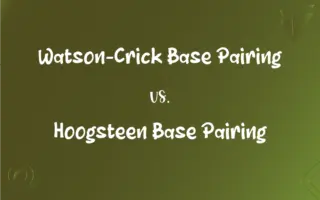Protestant vs. Pentecostal: What's the Difference?
Edited by Aimie Carlson || By Janet White || Published on February 4, 2024
Protestantism is a diverse branch of Christianity, while Pentecostalism is a movement within Protestantism emphasizing direct personal experience with God through the Holy Spirit.

Key Differences
Protestantism emerged from the Reformation, a 16th-century movement against certain practices of the Catholic Church. It encompasses various denominations like Lutherans and Baptists. Pentecostalism, originating in the early 20th century, is a subset of Protestantism known for its emphasis on the Holy Spirit, speaking in tongues, and charismatic worship.
The Protestant movement is characterized by its adherence to the Bible as the sole source of religious authority and the doctrine of salvation by faith alone. In contrast, Pentecostalism places a strong emphasis on spiritual gifts, such as healing and prophecy, as signs of the Holy Spirit's presence.
Protestantism paved the way for diverse interpretations and practices within Christianity. It includes a range of theological perspectives from conservative to liberal. Pentecostalism, while part of this diversity, is specifically noted for its revivalist and enthusiastic worship style.
In Protestantism, worship styles and church governance vary widely among denominations. Pentecostal worship is distinctly known for its lively, emotive worship services, with a focus on personal spiritual experiences and miracles.
Historically, Protestantism has been influential in shaping Western society and culture. Pentecostalism, though younger, has rapidly grown globally, particularly in the Global South, impacting Christianity with its vibrant and experiential faith expression.
ADVERTISEMENT
Comparison Chart
Origins
16th-century Reformation
Early 20th-century movement
Key Beliefs
Bible as sole authority, salvation by faith
Emphasis on Holy Spirit, spiritual gifts
Worship Style
Varies among denominations
Lively, emotive, charismatic
Global Influence
Shaped Western culture
Rapid growth, especially in Global South
Theological Spectrum
Wide, from conservative to liberal
Generally more conservative
ADVERTISEMENT
Protestant and Pentecostal Definitions
Protestant
Of or pertaining to the Protestant Reformation or its principles.
The church's architecture has a distinct Protestant simplicity and functionality.
Pentecostal
Of or relating to Pentecostalism, a Christian movement emphasizing direct personal experience with God.
The Pentecostal church down the street is known for its vibrant worship services.
Protestant
A member of the Christian churches that separated from the Roman Catholic Church during the Reformation.
The Protestant community in our town gathers every Sunday for worship.
Pentecostal
A member of a Pentecostal Church, known for speaking in tongues and lively worship.
As a Pentecostal, she believes in the active working of the Holy Spirit in everyday life.
Protestant
A person who advocates or adheres to Protestant principles.
As a Protestant, she held the Bible as the ultimate authority in her life.
Pentecostal
Pertaining to the belief in the manifestation of the gifts of the Holy Spirit.
The Pentecostal congregation actively practices faith healing during their gatherings.
Protestant
Relating to or belonging to any of the Western Christian churches that are separate from the Roman Catholic Church.
The Protestant ethic was a significant force in shaping modern capitalism.
Pentecostal
Emphasizing the experience of baptism with the Holy Spirit, as evidenced by speaking in tongues.
The Pentecostal movement has significantly influenced contemporary Christian music.
Protestant
Characterized by the rejection of papal authority and acceptance of general Christian principles.
The Protestant doctrine of 'justification by faith alone' was revolutionary in its time.
Pentecostal
Characterized by enthusiastic worship and belief in modern-day miracles.
Pentecostal Christians often share testimonies of miracles and divine interventions.
Protestant
A member of a Western Christian church whose faith and practice are founded on the principles of the Reformation, especially in the acceptance of the Bible as the sole source of revelation, in justification by faith alone, and in the universal priesthood of all the believers.
Pentecostal
Of, relating to, or occurring at Pentecost.
Pentecostal
Of, relating to, or being any of various Christian religious congregations whose members seek to be filled with the Holy Spirit, in emulation of the Apostles at Pentecost.
Pentecostal
A member of a Pentecostal congregation.
Pentecostal
Of or pertaining to Pentecost or to Whitsuntide.
Pentecostal
Any member of a Pentecostal religious body
Pentecostal
Of or relating to or characteristic of any of various Pentecostal religious bodies or their members
Pentecostal
Of or relating to or occurring at Pentecost
FAQs
What is Protestantism?
Protestantism is a branch of Christianity that originated with the Reformation, a movement against the practices of the Catholic Church in the 16th century.
How did Protestantism begin?
Protestantism began in the 16th century as a movement against certain Catholic doctrines and practices, leading to the formation of new Christian denominations.
Who are prominent figures in Protestantism?
Prominent figures in Protestantism include Martin Luther, John Calvin, and Ulrich Zwingli.
What is Pentecostalism?
Pentecostalism is a Christian movement within Protestantism known for its emphasis on the Holy Spirit, spiritual gifts, and charismatic worship.
What is the Protestant view on salvation?
Protestants generally believe in salvation by faith alone, not by works.
Who are prominent figures in Pentecostalism?
Prominent figures in Pentecostalism include Charles Parham and William J. Seymour, key figures in the early Pentecostal movement.
How do Protestant and Pentecostal worship styles differ?
Protestant worship styles vary widely among denominations, while Pentecostal worship is known for its emotive and charismatic elements.
What is the Pentecostal view on spiritual gifts?
Pentecostals believe that spiritual gifts, like speaking in tongues and healing, are active and essential parts of Christian life today.
Are all Pentecostals Protestants?
Yes, Pentecostalism is a movement within Protestant Christianity.
Do Protestants have sacraments?
Protestants typically recognize two sacraments: baptism and the Lord's Supper, but interpretations and practices vary.
What impact has Protestantism had on society?
Protestantism has significantly influenced Western culture, ethics, and social structures, particularly through the Protestant work ethic.
What are key beliefs of Protestants?
Key Protestant beliefs include the authority of Scripture, justification by faith, and the priesthood of all believers.
How do Protestant denominations differ?
Protestant denominations differ in theology, governance, worship style, and interpretation of scripture.
Is Pentecostalism growing globally?
Yes, Pentecostalism is one of the fastest-growing segments of Christianity, especially in the Global South.
What is the Protestant stance on church authority?
Protestants typically reject papal authority, emphasizing the local church's autonomy and the priesthood of all believers.
How do Pentecostals view church leadership?
Pentecostal churches often have charismatic leaders and emphasize the role of pastors and elders.
What are key beliefs of Pentecostals?
Key Pentecostal beliefs include baptism in the Holy Spirit, speaking in tongues, and the active use of spiritual gifts.
How do Protestants interpret the Bible?
Protestants interpret the Bible as the sole authority on matters of faith and practice, often with an emphasis on personal interpretation.
What is the Pentecostal stance on Bible interpretation?
Pentecostals interpret the Bible as the inerrant word of God, often emphasizing experiential aspects of faith.
Do Pentecostals practice baptism?
Yes, Pentecostals practice believer's baptism, usually by immersion.
About Author
Written by
Janet WhiteJanet White has been an esteemed writer and blogger for Difference Wiki. Holding a Master's degree in Science and Medical Journalism from the prestigious Boston University, she has consistently demonstrated her expertise and passion for her field. When she's not immersed in her work, Janet relishes her time exercising, delving into a good book, and cherishing moments with friends and family.
Edited by
Aimie CarlsonAimie Carlson, holding a master's degree in English literature, is a fervent English language enthusiast. She lends her writing talents to Difference Wiki, a prominent website that specializes in comparisons, offering readers insightful analyses that both captivate and inform.































































